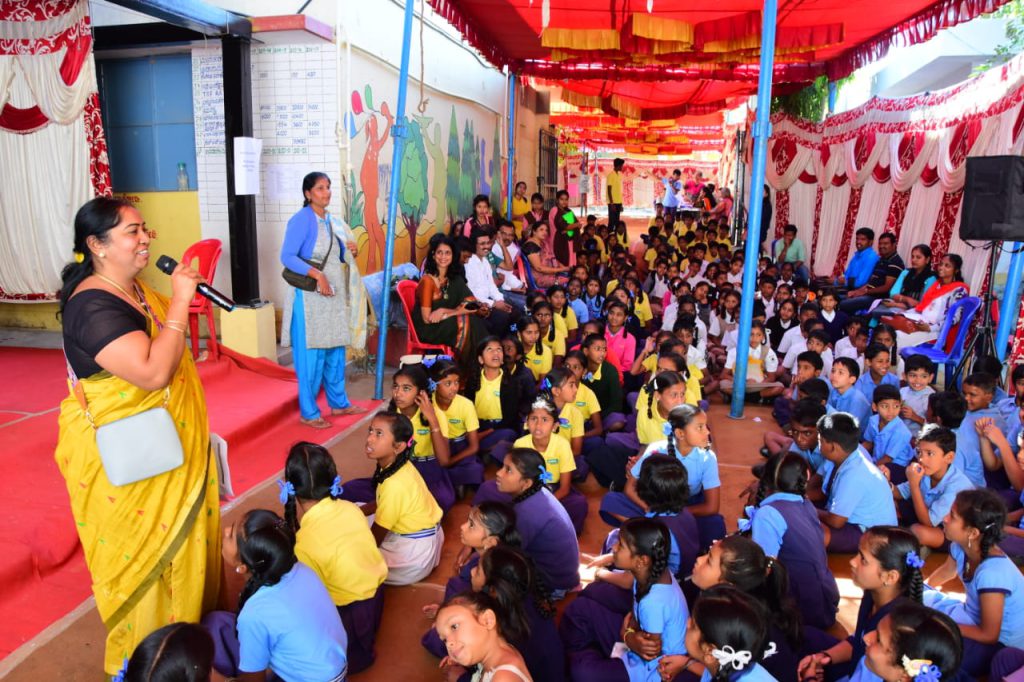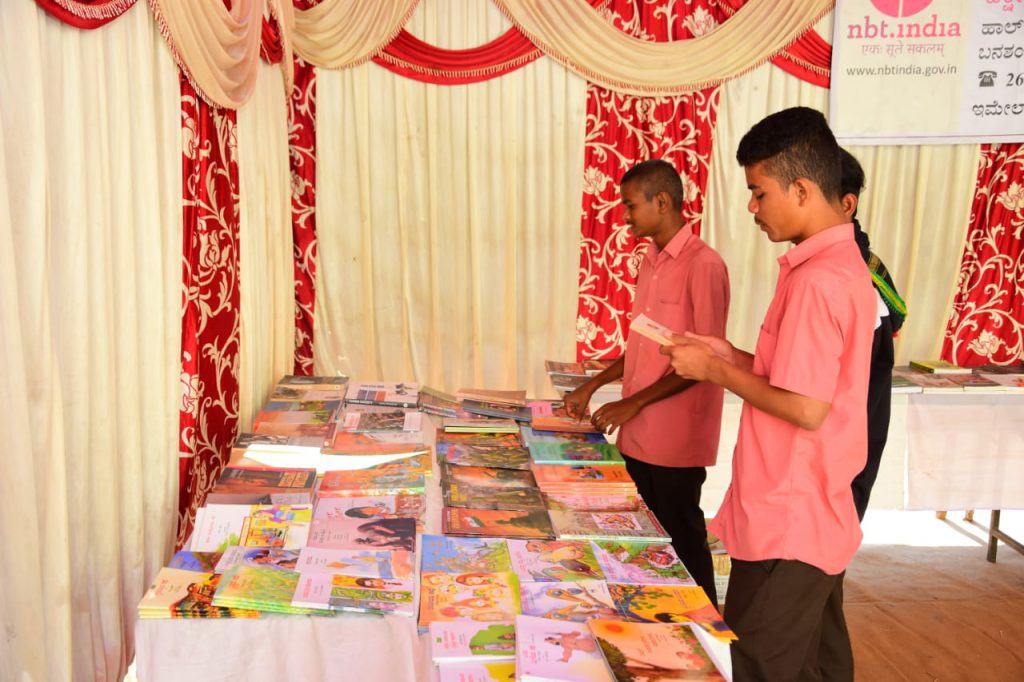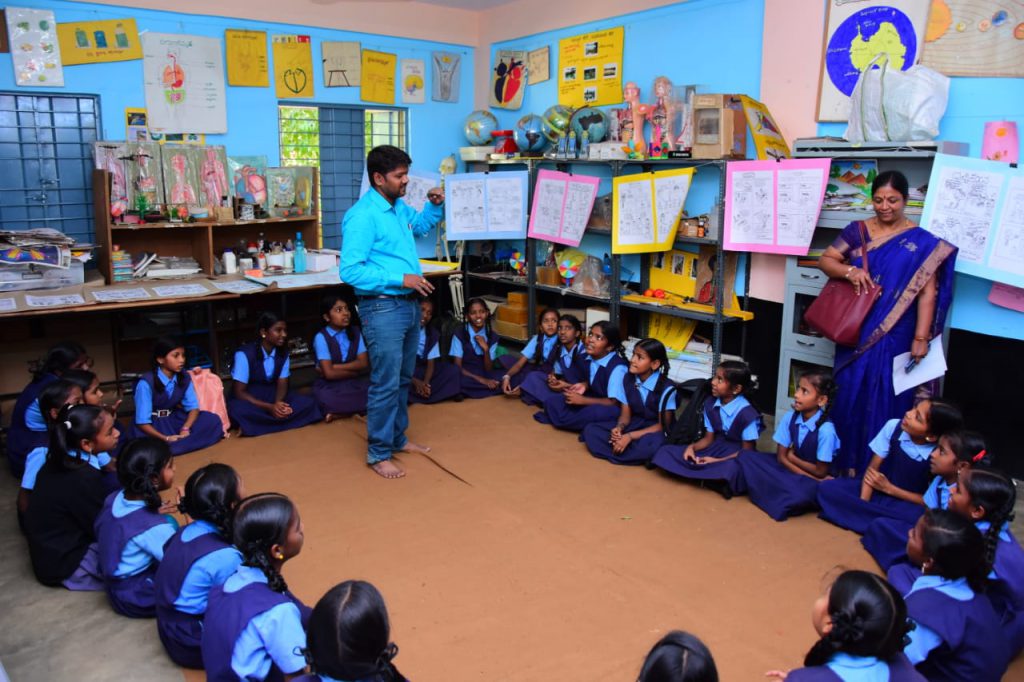The Azim Premji Foundation hosted a three-day children’s Literature Festival – KathaVana 2019 — focused on engaging teachers and children with a variety a high-quality literary experiences at the following locations:
· Tuesday,10th December 2019, GHPS Hosahalli (Vijayanagara), South-2 Block
· Wednesday, 11th December 2019, Yediyur Government Primary School, South-3 Block
· Friday, 13th December 2019, Hebbagodi Government School, Anekal Block

Literature plays a vital role – in society and in human lives. Recent decades have seen increasing interest in children’s literature in India, but it still does not find a meaningful place in schools, classrooms and libraries. This is true of most schools across region and class in India, but as with most other issues, it impacts the disadvantaged sections of society the most. Since 2012, KathaVana has engaged with the following questions:

· Can young children be introduced in interesting and meaningful ways to literature?
· Can teachers be introduced to — and convinced about — the power and relevance of literature in the lives of their students?

Keeping with the broad vision of Azim Premji Foundation, KathaVana focuses on government schools, which are a very neglected and under-served part of the educational landscape of India. KathaVana includes a simultaneous focus on both teacher and student learning.
Previous years’ experience indicates that in a mega-city like Bengaluru, a single mela is simply not enough. Having a mela in three different government school blocks (Hosahalli, Yediyur and Hebbagodi) ensures that students and teachers from different blocks are able to experience the festival and to get exposure to the idea of using children’s literature in educational contexts.
Across the three days, approximately 1280 students and 56 teachers from 27 schools in the three participating blocks participated for an entire day at the festival. In addition, another 140 teachers and educational functionaries visited the festival for briefer periods of time. The break-up by day is given below:
| 10h Dec Hosahalli | No of Children(Approx) | No. of schools | Teachers | Teacher Visitors/Educational Functionaries |
| 400 | 10 | 20 | 60 | |
| 11th Dec Yediyur | No of Children(Approx) | No. of schools | Teachers | Teacher Visitors/Educational Functionaries |
| 430 | 8 | 15 | 50 | |
| 13th Dec Hebbagodi | No of Children(Approx) | No. of schools | Teachers | Teacher Visitors/Educational Functionaries |
| 450 | 9 | 21 | 30 |
At each location, the mela hosted 12-13 activity centers focused on children’s literature (see appendix). These centers included: oral storytelling, reading aloud children’s books, performance-based stalls like Yakshagana, poetry-writing, meet-the-author and meet-the-illustrator events, narrating story through cartoon strips, puppetry, and so on. Children were exposed to folk-dance, folk-songs, as well as more contemporary forms of literature. The centers were run by experienced resource people from across Bangalore and the state who conducted 40-50 minute sessions either in Kannada, or bilingually in English and Kannada. “It is important that children are able to relate to the language in order to be able to fully participate and respond”, said Ramchender Giri (Bangalore District Institute, Azim Premji Foundation), a key organizer of the event.
Teachers accompanied their students to the centers and observed the sessions closely. Teachers were given a reflection form that permitted them to write about their experiences and observations at the festival. Azim Premji Foundation members plan to meet with the participating teachers after the festival to reflect and debrief on what they observed and experienced.
“In many melas, people flit in and out of various stalls and experiences, observing various things”, said Professor Shailaja Menon (Faculty, School of Education, Azim Premji University and founder member of the KathaVana festival). “That is not how we have conceptualized KathaVana. Every child and teacher who comes to KathaVana attends a minimum of four carefully planned sessions in a day. These sessions are interactive in nature; they require the children’s full attention and participation, rather than having them simply observe performances. Our hope is that even though these sessions are brief, the interactions are of a high literary quality and will leave a lasting impression on the minds of the children and of their teachers.”
In addition to the activity centers, there were book-exhibition-cum-sales stalls set up by the National Book Trust and Funky Rainbow bookstore at the Hosahalli school; and by the National Book Trust at Yediyur. Teachers, students and resource people browsed through, and bought books at these stalls. It is the hope of the organizers that enough awareness about children’s literature was created in the three participating blocks to create fertile ground for taking children’s literature meaningfully into government schools and classrooms.
Thank you for this blog and this is very valuable